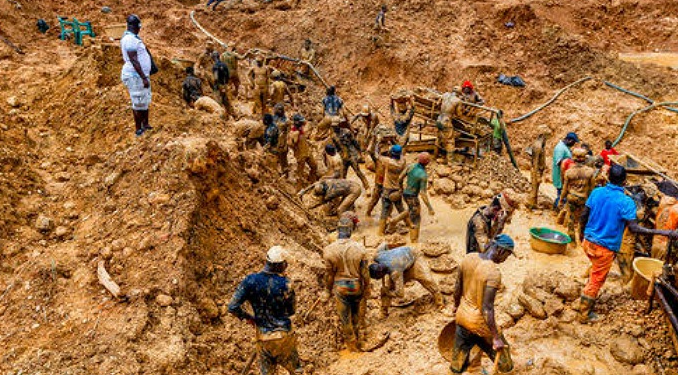
A new report by the United Nations has revealed that the surging global appetite for gold and other critical minerals is driving a wave of corruption, crime, and instability—particularly across Africa’s resource-rich regions.
The report, released Tuesday by the United Nations Office on Drugs and Crime (UNODC), is titled “Minerals Crime: Illegal Gold Mining”—the second part of the Global Analysis on Crimes that Affect the Environment. It sheds light on how the booming demand for minerals is intensifying illicit activity throughout the supply chain, with far-reaching consequences for governance, economies, and the environment.
According to the report, criminal networks—including organized crime syndicates, corrupt corporations, and rogue individuals—are increasingly embedding themselves into gold and mineral supply chains. Drawn by record-high prices and ease of trade, these groups exploit weak regulatory frameworks to traffic illegal gold and launder proceeds across international borders.
Africa a Key Target for Mineral Crime
Africa remains a focal point for these illegal operations, with many countries sitting atop vast reserves of minerals essential for the global energy transition—such as cobalt, manganese, and platinum. Much of this extraction is carried out through artisanal and small-scale mining (ASM), which employed nearly 10 million people in Sub-Saharan Africa as of 2019.
However, in conflict-prone regions like the Sahel, ASM has become closely intertwined with transnational crime and armed groups. The UNODC report notes that politically motivated criminal networks often coerce artisanal miners into selling gold far below market value, while illicit traders smuggle and sell it at inflated prices to launder money and evade taxes.
From 2014 to 2016, for example, large volumes of artisanal gold were trafficked into Togo, where buyers paid above-market rates to bypass currency restrictions—distorting local economies and undermining state revenues.
The Role of Corruption and Corporate Fraud
The report outlines how corruption seeps into every level of the mineral trade—from bribing public officials to forging documents and obtaining illegal mining concessions. In some cases, traders use false declarations—such as claiming gold is recycled or misreporting its origin—to launder illegal metals into formal markets.
“Gold is a high-risk commodity, frequently used as a tool for money laundering owing to its high value, ease of transport, and because it can be quickly sold or exchanged for cash in many parts of the world,” the report stated.
Global Trends and Human Costs
The UNODC also highlights similar patterns in Latin America and parts of Asia. In some Latin American countries, drug cartels have expanded into gold mining, using existing smuggling infrastructure to fund other criminal activities. Meanwhile, in Asia, lax oversight has enabled gold smuggling as a way to dodge import tariffs and strict currency controls.
The report warns of severe humanitarian fallout in communities near illegal mining sites. These include widespread displacement, sexual exploitation, child labor, and hazardous working conditions. The environmental toll is equally severe, with illegal operations driving deforestation, mercury pollution, and long-term ecological damage.
UN Calls for Urgent Global Response
Angela Me, UNODC’s Chief of Research and Analysis, called for stronger international cooperation and oversight to tackle mineral-related crime.
“We need better data to quickly spot and respond to the criminal exploitation of the mining sector, together with more globally harmonized legislation and standards,” she said. “Due diligence and traceability of critical minerals are essential, alongside targeted law enforcement responses.”
Nigeria Steps Up Fight Against Illegal Mining
In Nigeria, the impact of illegal mining is already being felt. The country has seen growing economic losses and rising violence in regions plagued by unregulated mineral extraction. In response, the government is stepping up enforcement efforts.
Most recently, the Nasarawa State House of Assembly passed a new law aimed at curbing illegal mining in the state. The legislation imposes severe penalties, including:
A fine of up to ₦10 million or 2–5 years in prison for corporate offenders.
₦5 million fines or 2–5 years imprisonment for individuals and group members found guilty of illegal mining activities.
The move is part of a broader national effort to reclaim control of the sector and prevent criminal exploitation of Nigeria’s natural resources.
Bottom Line:
As the global race for gold and energy-critical minerals intensifies, so too does the need for robust oversight, international collaboration, and legal reforms to ensure these valuable resources do not become a curse for the communities that harbor them.
